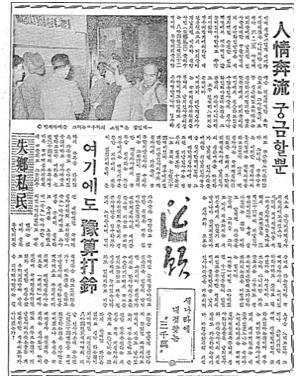Name: admin
2014-01-02 14:54:27 | Hit 2151
30 Million families of abductees demand to know abductees’ fates
Budget limit on finding displaced civilians
P.3, Chosun Daily, Sept. 20, 1960
◇ Will finding our brothers and sisters remain only a dream?
According to government statistics, there are 84,532 so-called "displaced civilians;" non-combat personnel abducted by North Korea. Considering the North Korean government's cruelty, it is hard to believe that all these abductees are still alive. But to find out whether or not they are alive is a very important matter to South Koreans, not to mention to the abductees' families.
The Korean Red Cross has persistently attempted to find out the fate of the abductees and to acquire a list of survivors through the International Committee of the Red Cross (ICRC). But the South Korean government has not provided any support to these efforts. A good example is the Korean Red Cross’s registration of abductees. The Korean Red Cross initiated the registration in order to submit the abductee list to the North Korean government via the ICRC in order to find out the fates of the abductees.
The number of registered abductees was only 7,034, less than one tenth the number tallied by the government. There could be many reasons for this small number. However, many said that the main reason was that a substantial number of the abductees' families did not register because they did not know about the registration process. Many criticized the government for its lack of support in ensuring that not only people in cities, but also those in rural areas be informed of the registration. The list of 7,034 abductees was sent to the North Korean government by the ICRC, and the North confirmed that 336 of the 7,034 people are still alive. It was delightful news for the families of the surviving abductees, but it was a big disappointment for families who did not hear anything from North Korea.
The Korean Red Cross is still doing its best to find survivors through the ICRC. It also explained the current state of the matter to Dr. Marcel Juneau during his recent visit to Korea, and asked for his cooperation as an intermediary. He promised to do his part. People are aware that, even with the effort of the International and Korean Red Cross, it will be very difficult to get what they want from the North. This is why they are so disappointed at the government’s lack of support.
Some advanced nations have been contacting countries where their nationals have been detained for years through unofficial channels to save them, even though the countries are at war or there is no diplomatic relationship between them. In contrast, the South Korean government is making no effort to save its people abducted by the North. It will not even provide the Korean Red Cross with the financial support needed to dispatch a delegate to Geneva to learn the fates of the abductees.
It is essential to dispatch a delegate to Geneva to generate as many contacts as possible and express the hope and desire to at least know whether the abductees are alive or not. A little more effort and financial support from the Korean government would enable the International Red Cross to get confirmation of the fates of the abductees from the North, and also enable the abductees' families to exchange letters with their loved ones in North Korea.
The government's reluctance to address this issue might be rooted in old ways of thinking; namely that exchanging letters between South and North could be a threat to national security. However, many people think that there is no reason to oppose this idea because the letters will only be personal news and exchanged through the International Red Cross. Only allowing letter exchanges for the registered 7,034 of 84,500 abductees is still a matter of debate, but what the government could at least do now is cooperate with the ICRC to find out the fates of the rest of the abductees.
Budget limit on finding displaced civilians
P.3, Chosun Daily, Sept. 20, 1960
◇ Will finding our brothers and sisters remain only a dream?
According to government statistics, there are 84,532 so-called "displaced civilians;" non-combat personnel abducted by North Korea. Considering the North Korean government's cruelty, it is hard to believe that all these abductees are still alive. But to find out whether or not they are alive is a very important matter to South Koreans, not to mention to the abductees' families.
The Korean Red Cross has persistently attempted to find out the fate of the abductees and to acquire a list of survivors through the International Committee of the Red Cross (ICRC). But the South Korean government has not provided any support to these efforts. A good example is the Korean Red Cross’s registration of abductees. The Korean Red Cross initiated the registration in order to submit the abductee list to the North Korean government via the ICRC in order to find out the fates of the abductees.
The number of registered abductees was only 7,034, less than one tenth the number tallied by the government. There could be many reasons for this small number. However, many said that the main reason was that a substantial number of the abductees' families did not register because they did not know about the registration process. Many criticized the government for its lack of support in ensuring that not only people in cities, but also those in rural areas be informed of the registration. The list of 7,034 abductees was sent to the North Korean government by the ICRC, and the North confirmed that 336 of the 7,034 people are still alive. It was delightful news for the families of the surviving abductees, but it was a big disappointment for families who did not hear anything from North Korea.
The Korean Red Cross is still doing its best to find survivors through the ICRC. It also explained the current state of the matter to Dr. Marcel Juneau during his recent visit to Korea, and asked for his cooperation as an intermediary. He promised to do his part. People are aware that, even with the effort of the International and Korean Red Cross, it will be very difficult to get what they want from the North. This is why they are so disappointed at the government’s lack of support.
Some advanced nations have been contacting countries where their nationals have been detained for years through unofficial channels to save them, even though the countries are at war or there is no diplomatic relationship between them. In contrast, the South Korean government is making no effort to save its people abducted by the North. It will not even provide the Korean Red Cross with the financial support needed to dispatch a delegate to Geneva to learn the fates of the abductees.
It is essential to dispatch a delegate to Geneva to generate as many contacts as possible and express the hope and desire to at least know whether the abductees are alive or not. A little more effort and financial support from the Korean government would enable the International Red Cross to get confirmation of the fates of the abductees from the North, and also enable the abductees' families to exchange letters with their loved ones in North Korea.
The government's reluctance to address this issue might be rooted in old ways of thinking; namely that exchanging letters between South and North could be a threat to national security. However, many people think that there is no reason to oppose this idea because the letters will only be personal news and exchanged through the International Red Cross. Only allowing letter exchanges for the registered 7,034 of 84,500 abductees is still a matter of debate, but what the government could at least do now is cooperate with the ICRC to find out the fates of the rest of the abductees.






















 FAX : (82)31-930-6099
FAX : (82)31-930-6099
